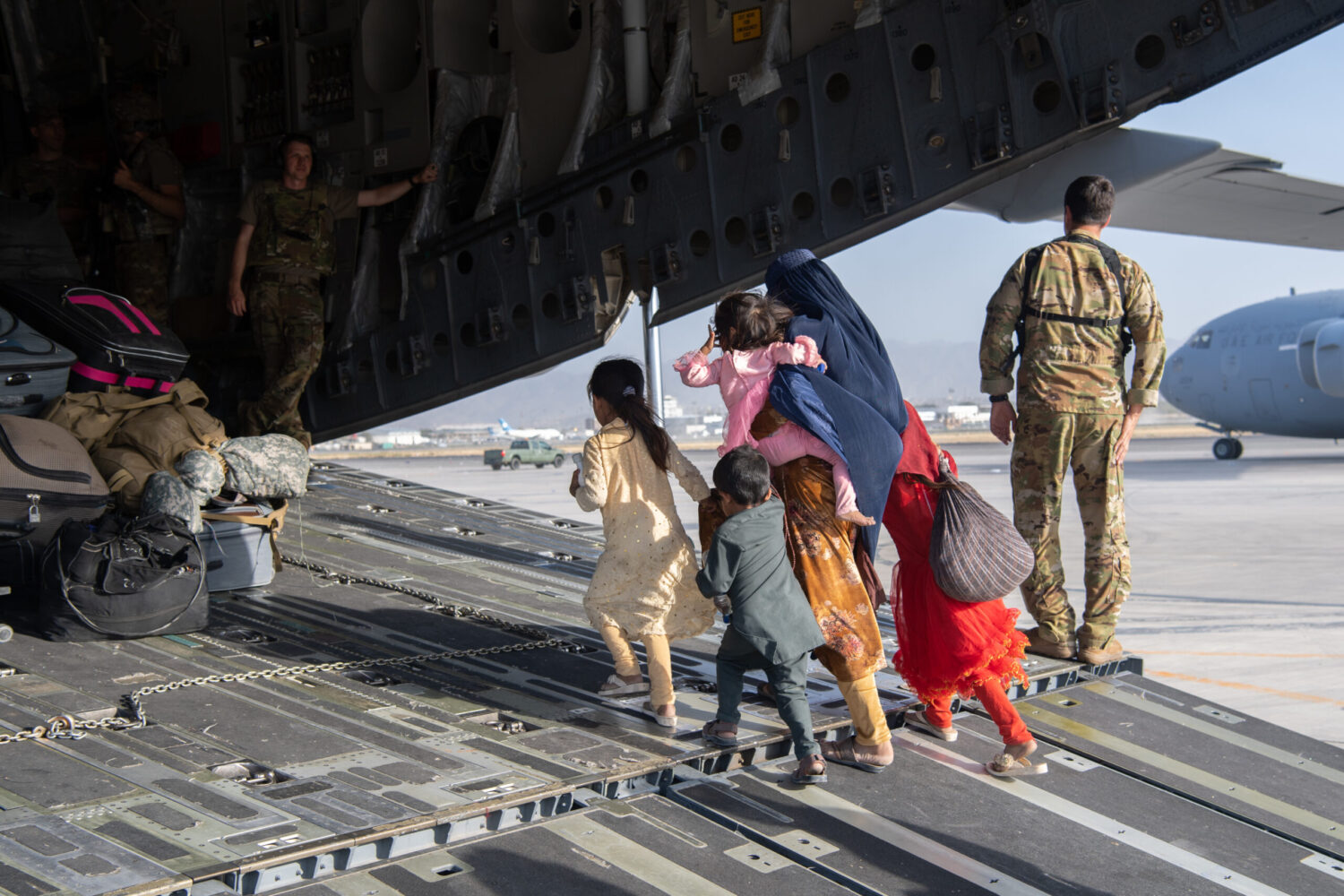Afghan refugees who aided the U.S. stuck in legal limbo, two years after Kabul’s fall

Two years ago, Farzana Jamalzada and her husband made the difficult decision to separately flee Afghanistan, after U.S. troops withdrew from the country and the Taliban took over.
It took days for the couple to be reunited at an airport in Qatar, where Jamalzada would show people a picture of her husband on her phone, asking them if they had seen him.
Once reunited, they were settled into the U.S. through the Biden administration’s humanitarian parole program for Afghans that extended protections for two years, allowing them to work and live in the U.S. Because Jamalzada worked for the U.S. government in Afghanistan, she was able to apply for a Special Immigrant Visa, which is available to those who were translators, interpreters or professionals employed by or on behalf of the U.S. government in Afghanistan or Iraq.
“It has been two years and every day we are in an uncertain situation,” she said in an interview with States Newsroom. “It is very frustrating.”
Legislation in Congress known as the Afghan Adjustment Act would allow Afghan refugees to apply for permanent legal residency after undergoing additional vetting, but it’s failed to advance. Without congressional action on a pathway to citizenship, most of the more than 76,000 Afghan refugees who came to the U.S. after the Taliban takeover are stuck in legal limbo.
The humanitarian program under which they arrived in the U.S., known as Operation Allies Welcome, does not provide a pathway to citizenship. But Afghans enrolled can apply for asylum, and those who qualify can apply for a Special Immigrant Visa. Claims for asylum and the Special Immigrant Visa have a major backlog.
“For most Afghans, they’re in this kind of limbo status and waiting to see,” said Julia Gelatt, the associate director of the Migration Policy Institute’s U.S. immigration policy program.
Jamalzada and her husband, now settled in New York City, have a hearing for their green cards scheduled for Sept. 12, but their work authorization expires at the end of August. The two-week gap means neither will be legally allowed to work in the U.S., risking termination from their jobs.
“You don’t have peace of mind,” she said. “Being away from your country, your family, you’re alone in a very strange world, and yet you don’t have that support,” she said, referring to permanent protections in the U.S.
Jamalzada, now 27, said she prays that either her and her husband’s work visas are reauthorized, or that Congress passes the Afghan Adjustment Act.
For 20 years, the U.S. government relied on Afghans to help the government and military following the 2001 invasion. Afghans worked as interpreters and helped run aid programs, such as Jamalzada, who worked on women’s empowerment projects with the United States Agency for International Development and at the Afghan presidential palace.
“Keep your promise and support the people who stood on your side and helped you,” she said.
Parole set to expire
Operation Allies Welcome evacuated and paroled 76,200 Afghans from August 2021 to September 2022. A majority settled in areas with large military bases such as Texas, California, Maryland, Virginia, Washington and New York.
But two years after the fall of Kabul, only a fraction — fewer than 10% — in the humanitarian parole program have secured permanent protections, through either asylum or the Special Immigrant Visa, said Krish O’Mara Vignarajah, the president of the Lutheran Immigration and Refugee Service. Her organization, based in Baltimore, has helped settle more than 14,000 Afghans in the U.S.
“One of the biggest issues, I think, that remains uncertain is whether they will be allowed to remain permanently, and that relates to the Afghan Adjustment Act,” she said.
While those who worked for the U.S. government can apply for the Special Immigrant Visa program, many Afghans had to flee the country without the proper documentation needed to show their employment history.
“Part of that was because if they had the documentation on them, and were caught by the Taliban, that could be a death sentence,” O’Mara Vignarajah said.
O’Mara Vignarajah added that other Afghans applied for refugee status in other countries through Operation Allies Welcome and are waiting to be resettled in the U.S.
“The grim reality is that they’re likely waiting for years,” she said.
Laila Ayub, an immigration attorney and co-director of Project Afghan Network for Advocacy and Resources, said many Afghans have had no choice but to try to find a way into the U.S., even while they are waiting for their parole to be accepted by Operation Allies Welcome.
“We increasingly have been assisting people who have made a very long and difficult journey to the Southern border,” she said.
U.S. border agents apprehended more than 2,100 Afghans last year.
Grassley blocks resettlement plan
The closest Congress came to providing a quick pathway to citizenship for Afghans was last year, through the Afghan Adjustment Act, when Democrats controlled the House and Senate. However, those efforts were blocked by Republican Sen. Chuck Grassley of Iowa, and the bipartisan proposal was not included in an omnibus spending bill.
Grassley objected to the security and vetting processes for those Afghans.
He, along with several Senate Republicans, now are backing another bill by GOP Sen. Tom Cotton of Arkansas, known as the Ensuring American Security and Protecting Afghan Allies Act.
That bill would apply to those Afghans who were evacuated and who are ineligible for an immigration status that leads to a green card for citizenship. Those evacuees would be eligible for a four-year conditional resident status, to allow for vetting, and, upon successful completion, would become green card holders.
“The Biden Administration’s disastrous departure from Afghanistan caused a chaotic migration from the region, and our government repeatedly failed to thoroughly evaluate evacuees arriving in the United States,” Grassley said in a statement. “This bill restores order to the system by ensuring Afghan evacuees are able to assimilate while preserving American security and better supporting those who provided direct support to the United States military.”
However, the bill would limit the president’s authority to establish humanitarian parole programs, which the Biden administration has used as part of its immigration policy. It’s designated parole programs for nationals of Ukraine, Nicaragua, Haiti, Cuba and Venezuela.
The Cotton bill “is definitely throwing a wrench” in gaining support for the Afghan Adjustment Act, said Jennie Murray, president and CEO of the National Immigration Forum.
“We have used (humanitarian parole) several times in U.S. history across party lines, different presidents have used it, and it’s an important tool that we have to be able to use at a moment like World War II or the Cuban missile crisis,” she said. “It’s something that presidents have to be able to use, and so we’re very worried about that competitive legislation.”
Murray helped out evacuation efforts for Afghans when she worked for Upwardly Global, where she worked to put tougher a workforce plan for those Afghans arriving in the U.S.
She said a potential last shot at getting permanent protections for Afghans is through the National Defense Authorization Act, an annual must-pass defense policy measure.
“They cannot go back to Afghanistan,” she said. “They cannot go back to the Taliban-led state because they partnered with us.”
The NDAA does not currently include any provisions for a pathway to citizenship for those Afghans, but Murray notes that the measure is still in conference between the House and the Senate.
When the House passed its version of the NDAA, a bipartisan group of lawmakers reintroduced the Afghan Adjustment Act in the Senate and in the House.
Democratic U.S. Sen. Amy Klobuchar of Minnesota sponsored the bill in the Senate and Republican Rep. Mariannette Miller-Meeks of Iowa sponsored the bill in the House.



 Creative Commons Attribution
Creative Commons Attribution